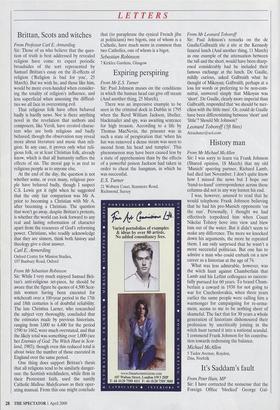LETTERS Brittan, Scots and witches
From Professor Carl E. Armerding Sir: Those of us who believe that the ques- tion of truth is best addressed by revealed religion have come to expect periodic broadsides of the sort represented by Samuel Brittan's essay on the ill-effects of religion (`Religion is bad for you', 25 March). But we wish he, and those like him, would be more even-handed when consider- ing the totality of religion's influence, and less superficial when assessing the difficul- ties we all face in overcoming evil.
That religious folk have often behaved badly is hardly news. Nor is there anything novel in the revelation that authors and composers, like Verdi, have created charac- ters who are both religious and badly behaved, though the observation may reveal more about literature and music than reli- gion. In any case, it proves only what reli- gious folk, or at least Christian folk, already know, which is that all humanity suffers the effects of sin. The moral gap is as real to religious people as to anyone else.
At the end of the day, the question is not whether some, or even many, religious peo- ple have behaved badly, though 1 suspect C.S. Lewis got it right when he suggested that the only fair comparison was Mr A. prior to becoming a Christian with Mr A. after becoming a Christian. The question that won't go away, despite Brittan's protests, is whether the world can look forward to any real and lasting reformation of character apart from the resources of God's reforming power. Christians, who readily acknowledge that they are sinners, think both history and theology give a clear answer.
Carl E. Armerding
Oxford Centre for Mission Studies, 107 Banbury Road, Oxford






















































































 Previous page
Previous page